
RxBenefits has released Illuminate Rx, a new PBM aiming to fill gaps in the current PBM market, according to Robert Gamble, CEO of RxBenefits.

RxBenefits has released Illuminate Rx, a new PBM aiming to fill gaps in the current PBM market, according to Robert Gamble, CEO of RxBenefits.
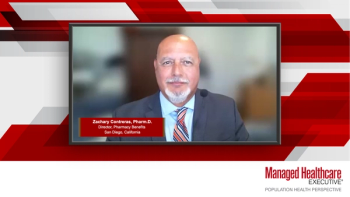
An expert discusses how health plans currently don’t utilize real-world evidence for decision-making due to lack of common standards and limited data at drug launch, but explains that AMCP is developing an RWE framework with different protocols for various drug life cycle phases.

An expert discusses how health plans evaluate high-cost NMIBC therapies by examining total cost of care, weighing risk versus reward for treatments like gene therapy that can cost over a million dollars, and using frameworks from NCCN guidelines and ICER to perform comparative effectiveness analyses.
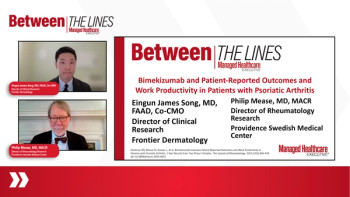
Panelists discuss how patients with psoriatic arthritis primarily present with pain in joints and enthesial sites, along with debilitating morning stiffness and fatigue that severely impacts their ability to perform daily activities and work functions.

Panelists discuss how patient-reported outcomes (PROs) are critical in psoriatic arthritis clinical trials because the disease affects multiple domains, including skin, joints, entheses and spine, creating a complex symptom burden that significantly impacts patients’ pain, fatigue and quality of life.

Scripius formulary executive Cody Olsen, Pharm.D., discusses some of the key ingredients to a successful switch to biosimilars.

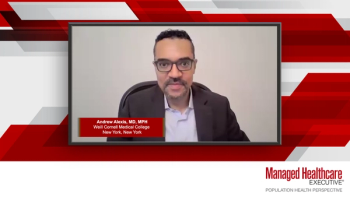
An expert discusses how the future of vitiligo treatment includes multiple oral JAK inhibitors in phase 3 trials for extensive disease, procedural therapies such as melanocyte grafting for resistant patches, and an overall promising outlook with increased disease awareness, broader therapeutic options, and improved patient outcomes expected over the next 5 years.


An expert discusses how health plans must defend all formulary decisions with clinical evidence and use NCCN/AUA guidelines to create treatment pathways rather than traditional tier placements, with BCG-unresponsive cases following a step-therapy approach from gemcitabine/docetaxel to nadofaragene based on cost and toxicity profiles.

An expert discusses how health plans establish coverage policies by referring to clinical trials, NCCN guidelines and disease association recommendations, using trial qualifying criteria to draft prior authorization requirements that are then reviewed by specialists before committee presentation.


Jennie Barlow, Pharm.D., MBA, associate vice president, pharmacy industry relations for Scripius, discusses cost savings from removing Jardiance (empagliflozin) as a preferred SGLT2 inhibitor and replacing it with Brenzavvy (bexagliflozin).
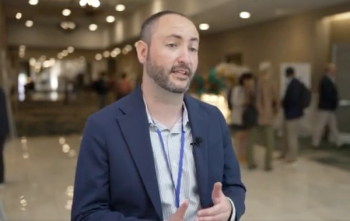
Joe Boyle shared proactive compliance strategies for PBMs at PBMI 2025, highlighting the need to adapt to evolving regulations for sustainable growth.

PBMs navigate increasing regulatory demands for transparency, as Joe Boyle stressed the need for robust data management and strategic compliance at PBMI 2025.

At the PBMI 2025 Conference, ClearFile president Joe Boyle encouraged PBMs to attend NAIC meetings, stressing that showing up and maintaining relationships with regulators is critical for long-term success.

Vertically integrated health plans are starting to fall by the wayside due to their limited flexibility, while modular health plans are gaining traction, according to Scott Rossignol, senior director of Drug Value Strategy at Abarca Health.

Employers face rising healthcare costs and specialty drug challenges, prompting a shift towards strategic partnerships with PBMs for better solutions, according to Karen van Caulil, Ph.D., president and CEO of the Florida Alliance for Healthcare Value, who chatted with MHE in the final installment of a two-part video interview.

Act 624 and ambiguous ERISA policies are some of the biggest issues faced by pharmacy benefit leaders today, according to Robyn Crosson, vice president of government relations, Navitus Health Solutions.

Employers are demanding more transparency and partnership from pharmacy benefit managers (PBMs), according to Karen van Caulil, Ph.D., president and CEO of the Florida Alliance for Healthcare Value, who spoke with MHE ahead of her remarks at the Pharmacy Benefit Management Institute’s annual meeting in Orlando.

Pharmacy and medical benefit programs have traditionally operated separately, despite having similarities. Nishi Goel, Pharm.D., vice president of customer experience, Agadia, is trying to change that.

The growing trend of at-home drug administration emphasizes the need for integrated medical and pharmacy reviews, according to Nishi Goel, Pharm.D., vice president of customer experience, Agadia.

An expert discusses how data from the pivotal phase 3 trials of topical ruxolitinib showed 30% of patients achieved 75% improvement in facial vitiligo at 24 weeks, with real-world experience confirming these results and demonstrating that longer treatment periods and combination with phototherapy can further enhance repigmentation outcomes
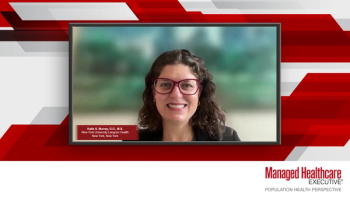
An expert discusses how clinicians now face the exciting challenge of selecting optimal treatments from multiple new options for BCG-unresponsive patients, opening opportunities for clinical research to determine the best sequencing and patient-specific approaches.
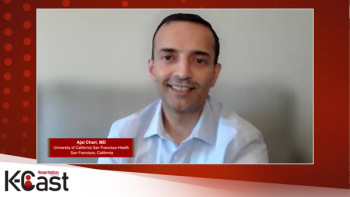
An expert highlights that overcoming clinical inertia in US community settings through targeted education and patient advocacy is essential to increase frontline use of CD38 antibodies in transplant-ineligible multiple myeloma, ensuring more patients benefit from proven, life-extending therapies.

Kasey Raetz, Pharm.D., vice president at Express Scripts and a winner of the PBMI Innovator Award, told MHE she takes pride in the role pharmacy benefit managers play in helping patients access needed care while supporting health plans in managing a complex system.

An expert discusses how JAK inhibitors represent targeted therapy that specifically blocks the interferon gamma–driven JAK-STAT pathway responsible for autoimmune melanocyte destruction in vitiligo, offering greater efficacy and safety compared with broad immunosuppressive treatments such as corticosteroids.

An expert discusses how gene therapy represents a breakthrough treatment approach for BCG-unresponsive patients, offering quarterly dosing that reduces treatment burden while showing promising response rates of 50% to 70% in real-world evidence.

An expert discusses how patients with BCG-unresponsive non-muscle invasive bladder cancer (NMIBC) now have several FDA-approved treatment options beyond radical cystectomy, including pembrolizumab, gene therapy and intravesical chemotherapy combinations.

In this second part of a three-part of a video series, Kasey Raetz, Pharm.D., a PBMI Innovator, told MHE about leading the development of EncircleRx, a program that balances patient access, holistic weight loss support and financial protection for health plans amid soaring demand for GLP-1 drugs.